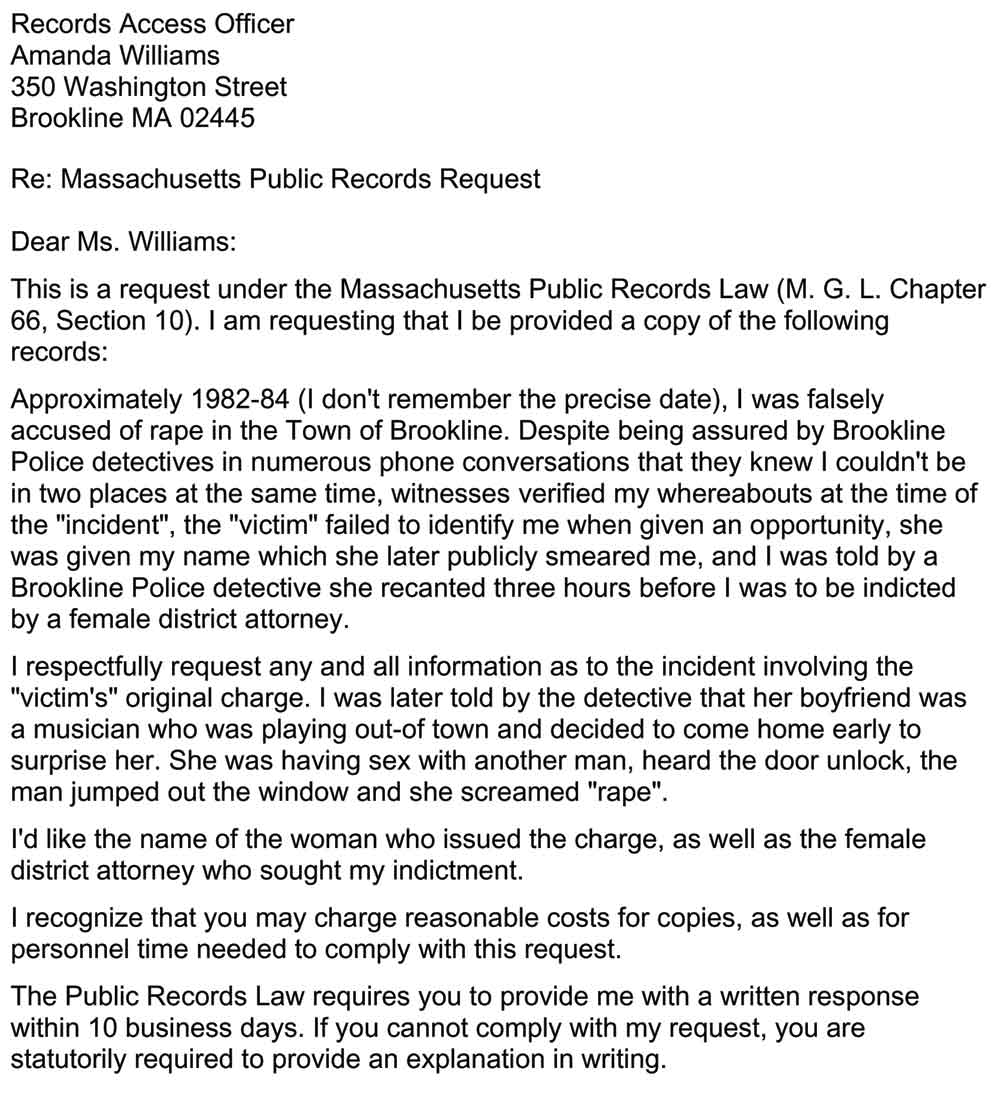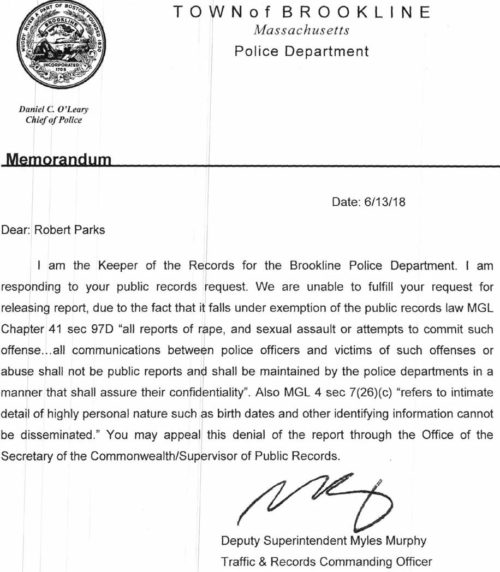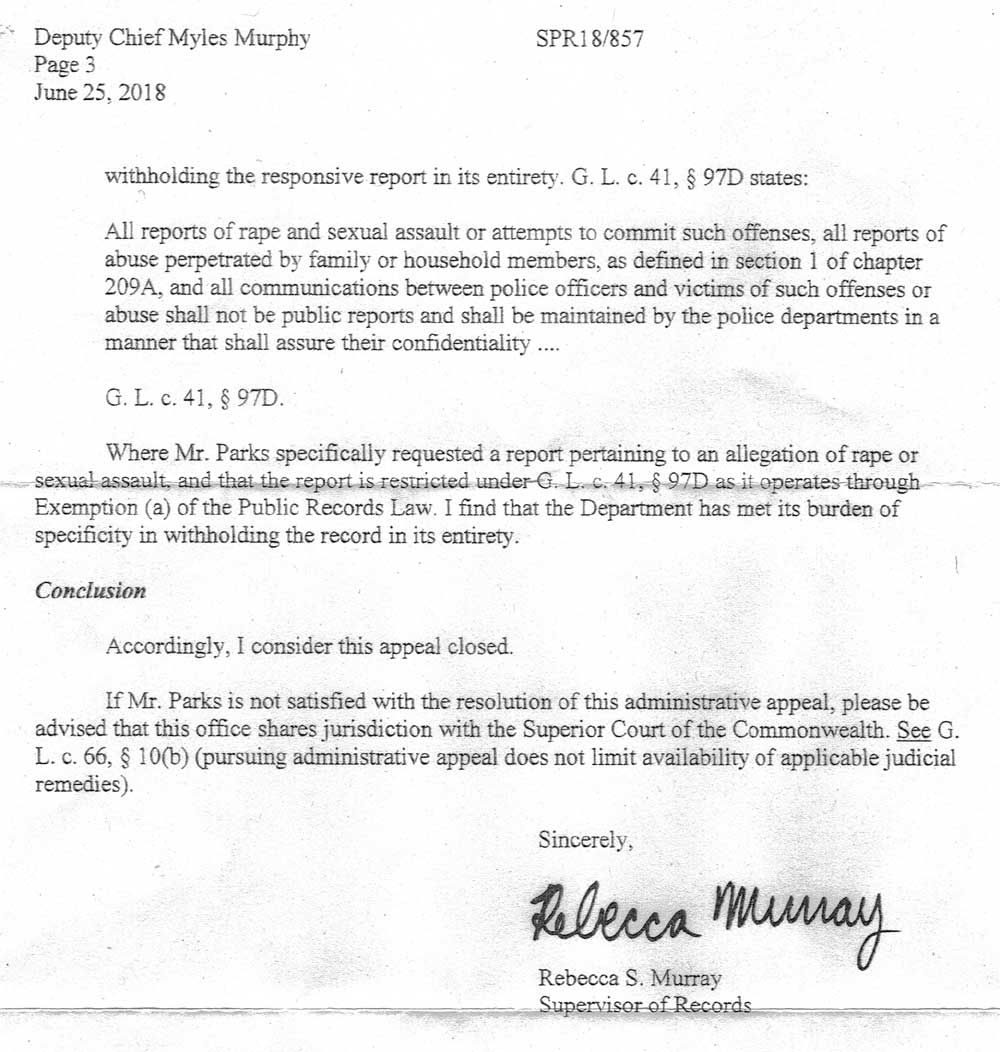I fairly recently received a rejection for employment, however I was never given a reason aside from there being something in my background that raised a red flag. There was an “incident” decades ago but seeing how I passed a CORI check so I could teach video production to middle school students in Massachusetts in the early 2000’s, I always assumed that incident was a non-issue.
That “incident” was a false rape accusation and for precaution-sake, I reached out to the Brookline Police Department to find out if there was anything lingering that may have reared its ugly head.

I received the following response from the Town of Brookline.

Okay, so….
 All reports of rape and sexual assault or attempts to commit such offenses, all reports of abuse perpetrated by family or household members, as defined in section 1 of chapter 209A, and all communications between police officers and victims of such offenses or abuse shall not be public reports and shall be maintained by the police departments in a manner that shall assure their confidentiality; provided, however, that all such reports shall be accessible at all reasonable times, upon written request, to: (i) the victim, the victim’s attorney, others specifically authorized by the victim to obtain such information, prosecutors and (ii) victim-witness advocates as defined in section 1 of chapter 258B, domestic violence victims’ counselors as defined in section 20K of chapter 233, sexual assault counselors as defined in section 20J of chapter 233, if such access is necessary in the performance of their duties; and provided further, that all such reports shall be accessible at all reasonable times, upon written, telephonic, facsimile or electronic mail request to law enforcement officers, district attorneys or assistant district attorneys and all persons authorized to admit persons to bail pursuant to section 57 of chapter 276. Communications between police officers and victims of said offenses and abuse may also be shared with the forgoing named persons if such access is necessary in the performance of their duties. A violation of this section shall be punished by imprisonment for not more than 1 year or by a fine of not more than $1,000, or both such fine and imprisonment.
All reports of rape and sexual assault or attempts to commit such offenses, all reports of abuse perpetrated by family or household members, as defined in section 1 of chapter 209A, and all communications between police officers and victims of such offenses or abuse shall not be public reports and shall be maintained by the police departments in a manner that shall assure their confidentiality; provided, however, that all such reports shall be accessible at all reasonable times, upon written request, to: (i) the victim, the victim’s attorney, others specifically authorized by the victim to obtain such information, prosecutors and (ii) victim-witness advocates as defined in section 1 of chapter 258B, domestic violence victims’ counselors as defined in section 20K of chapter 233, sexual assault counselors as defined in section 20J of chapter 233, if such access is necessary in the performance of their duties; and provided further, that all such reports shall be accessible at all reasonable times, upon written, telephonic, facsimile or electronic mail request to law enforcement officers, district attorneys or assistant district attorneys and all persons authorized to admit persons to bail pursuant to section 57 of chapter 276. Communications between police officers and victims of said offenses and abuse may also be shared with the forgoing named persons if such access is necessary in the performance of their duties. A violation of this section shall be punished by imprisonment for not more than 1 year or by a fine of not more than $1,000, or both such fine and imprisonment.
— Massachusetts General Law, Chapter 41, Section 97D
One slight problem: there was no rape, thus there was no “victim“.
The “victim” filed a police report of rape and valuable man hours were spent investigating. For some unknown reason, the “victim” was given my name and she subsequently referred to me personally as her attacker.
 A very nice Brookline police detective called my place of employment numerous times via the company switchboard (there were no personal smartphones at the time) and identified himself as such, which obviously created unwanted drama. He, on numerous occasions, assured me he knew I didn’t commit the “rape”. He told me he personally interviewed the bartender who knew me at the corner bar I frequented, as well as other patrons who knew me and confirmed my presence there at the time the “rape” was supposed to have occured.
A very nice Brookline police detective called my place of employment numerous times via the company switchboard (there were no personal smartphones at the time) and identified himself as such, which obviously created unwanted drama. He, on numerous occasions, assured me he knew I didn’t commit the “rape”. He told me he personally interviewed the bartender who knew me at the corner bar I frequented, as well as other patrons who knew me and confirmed my presence there at the time the “rape” was supposed to have occured.
During one such phone conversation with the detective, I was warned to be careful in the Town of Brookline because the boyfriend of the woman (who it turns out was cheating on him while he was out of town) made public threats that he was going to shoot me for raping his girlfriend.
The detective also gave the white “victim” an opportunity to identify me in a public place and once there, failed to do so. A white female district attorney (who obviously believed that women NEVER lie about rape) proceeded to pursue a criminal indictment. I was later told by the detective on the phone that I was three hours from being indicted for rape when the woman suddenly recanted her charge and the matter was dropped.
But the damage was done and I was later fired from my job due to mistakes made due to the stress making it hard to concentrate, as well as the numerous phone calls by police during my work hours.
The “victim” was allowed to just walk away, despite the female district attorney being made privy to information proving my innocence and still aggressively pursuing my prosecution.
 Massachusetts prosecutors have violated defendants’ rights to a fair trial regularly and without punishment, even as wrongfully convicted victims of tainted prosecutions have spent years in prison before being freed, decades of court rulings show. Some prosecutors failed to turn over important evidence to defense attorneys or didn’t disclose information bearing negatively on witness credibility, judges said. Others misrepresented evidence in their closing statements to the court.
Massachusetts prosecutors have violated defendants’ rights to a fair trial regularly and without punishment, even as wrongfully convicted victims of tainted prosecutions have spent years in prison before being freed, decades of court rulings show. Some prosecutors failed to turn over important evidence to defense attorneys or didn’t disclose information bearing negatively on witness credibility, judges said. Others misrepresented evidence in their closing statements to the court.
At least seven prosecutors whose behavior prompted courts to reverse convictions went on to higher posts. Some became judges and district attorneys.
— WGBH, 4/3/16
I attempted to appeal the denial of the public records of this incident with the Massachusetts Secretary of State’s office as instructed and was again denied because the identity of the “victim” had to remain protected and confidential.

“Closed”.
 So, what’s the conclusion here?
So, what’s the conclusion here?
If you are falsely accused of rape in Massachusetts, the false accuser is considered the “victim”, NOT the person who filed a false police report, which incidentally IS a crime.
Whoever intentionally and knowingly makes or causes to be made a false report of a crime to police officers shall be punished by a fine of not less than one hundred nor more than five hundred dollars or by imprisonment in a jail or house of correction for not more than one year, or both.
— Section 13A: False reports to police officers
If you are falsely accused of rape in Massachusetts, you have no access as to what was reported about you, the ability to contest the accuracy of what is in that police “record”, knowing who made the false allegations against, no say in who gets to see that “record” if requested, and how long that “record” will remain active. If there’s no statute of limitations regarding rape, then that false accusation “record” could be maintained indefinitely.
The fact the Town of Brookline has denied my request to see any or all information regarding the incident in question implies a “record” IS in existence and accessible should the right person ask.
 The fact a false rape accuser can achieve “victim” status in Massachusetts is something every male in the Commonwealth should be concerned about as their lives can be ruined; not only can the false accuser walk away, but Massachusetts will make sure that false incident comes back to haunt you and the person who ruined your life will get on with hers just fine.
The fact a false rape accuser can achieve “victim” status in Massachusetts is something every male in the Commonwealth should be concerned about as their lives can be ruined; not only can the false accuser walk away, but Massachusetts will make sure that false incident comes back to haunt you and the person who ruined your life will get on with hers just fine.
With the cooperation of the police agency of a small metropolitan community, 45 consecutive, disposed, false rape allegations covering a 9 year period were studied. These false rape allegations constitute 41% the total forcible rape cases reported during this period. These false allegations appear to serve three major functions for the complainants: providing an alibi, seeking revenge, and obtaining sympathy and attention. False rape allegations are not the consequence of a gender-linked aberration, as frequently claimed, but reflect impulsive and desperate efforts to cope with personal and social stress situations.
— Eugene J. Kanin, Ph.D., 1994
False rape accusations: Why must we pretend they never happen?
This is the reason why I’m highly suspicious whenever I hear or read about any sexual assault incident.
Please contribute to my GoFundMe as I attempt to rectify a situation I didn’t create and stop this from happening to anyone else.


Leave a Reply